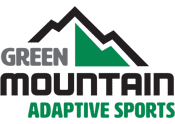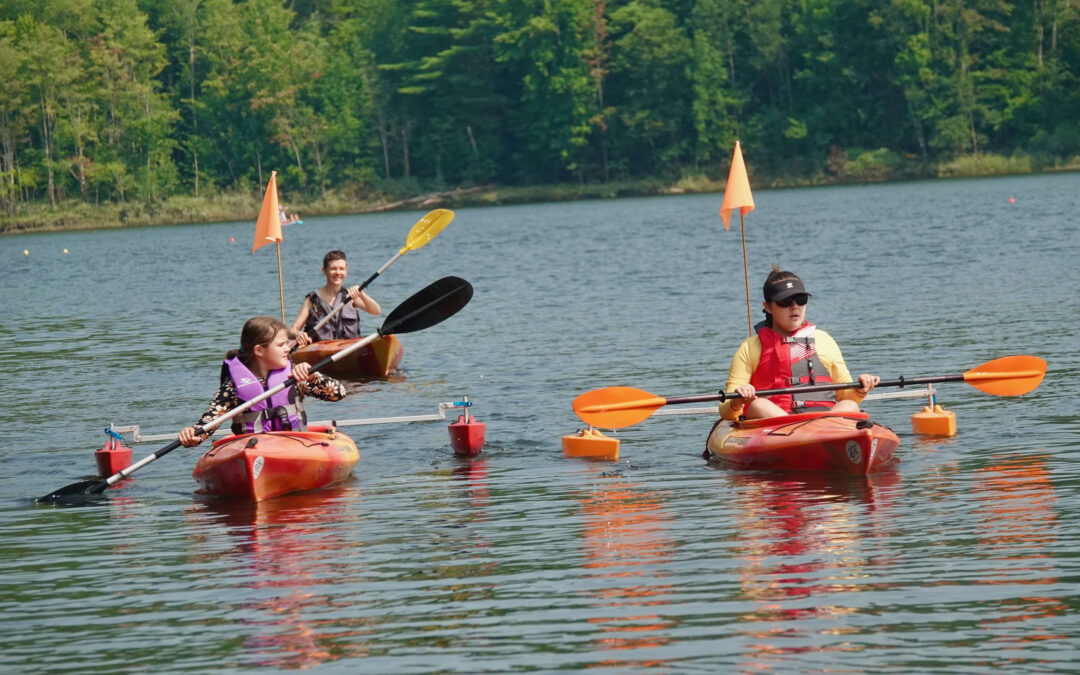All involved in the Green Mountain Adaptive Sports Adaptive Kayaking program will remember the Summer of 2023 as one filled with challenges, progress, accomplishments, and growth.
The weather this summer was challenging, and included too many rainy days to count, and severe flooding that closed Waterbury Reservoir for three weeks in July. Sadly, the program had to be shortened and three of the seven scheduled launches had to be canceled as a result.
Despite the testing conditions, GMAS kayakers were eager to get in the adapted kayaks equipped with angled oars. “The participants remember the activity from season to season, and are excited when they arrive and see their kayak waiting,” commented Cathy Webster, the mastermind running the many components of the program.
Collaboration and Growth
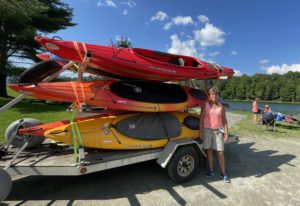
Cathy Webster with her fleet of kayaks.
Green Mountain Adaptive Sports (GMAS) partnered with Cathy Webster, who runs the adaptive kayaking program for the Northeast Disabled Adaptive Association (NDAA), to add kayaking to the GMAS program offerings three years ago. This year, the program saw the most growth ever, including ten new paddlers.
The four days of programming were extremely busy as 19 GMAS registered athletes showed up to paddle with their volunteer instructors. Collectively, they totaled an impressive 53 individual launches.
“The way the numbers are growing with this partnership is incredible. I think it’s over double versus last year,” added Webster.
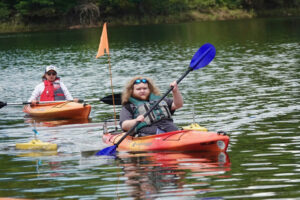
David paddling twice as far this year at the Waterbury Reservoir.
Volunteers offer invaluable support
GMAS volunteers generously support the weekly program. Everyone initially participates in a training course to get familiar with the responsibilities and learn the necessary skill set to help with the program. Once completed, they are able to join the crew and paddle weekly with the athletes, set up adaptive equipment, and offer help where needed.
“Having the GMAS board members who are also school therapists and are familiar with the participants makes the introduction of the sport seamless, just another therapeutic intervention, and a fun one,” explained Webster.
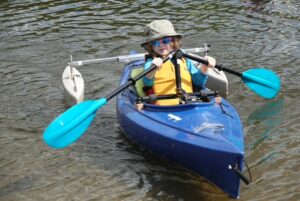
Geoffrey looks forward to his weekly kayaking sessions.
Meg Denton is a Pediatric Occupational Therapist and GMAS Board member. She and the other therapists volunteering for the GMAS program bring in a wealth of experience, knowledge, and tools from their profession that often lead to breakthroughs with some of the more challenging athletes.
“An athlete started out two years ago not knowing how to propel himself forward with paddles. By the end of the summer, he had learned how to move forward in the kayak using the paddles but couldn’t steer the kayak. One of his main interests is Sponge Bob Square Pants so we added pictures of Sponge Bob and his sidekick Patrick to the right and left paddling gloves which helped him to learn which arm to paddle with in order to steer the kayak. By the end of this summer, he was able to steer himself,” reports Denton.
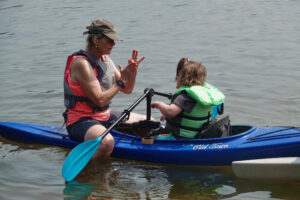
Meg Denton gives instruction using American Sign Language.
Meg Denton, also offers something very special to the program. She is proficient in American Sign Language and uses her skill with athletes to offer young paddlers instruction, support, and encouragement as needed.
“Adapting to the language needs of our athletes is important for their overall access to the sport. In one situation, the athlete is hard of hearing and uses sign language as her primary mode of communication. Having an instructor sit on the front of the kayak and sign to her gave her full access to sign language, which is a visual form of communication. This made her feel much more comfortable on the water. This particular athlete went from being quite fearful of being in the kayak to giggling during her sessions,” explains Denton.
“Despite it being a short summer on the water, it was productive,” concluded Carrie Dessureau, a Physical Therapist at Lamoille South Supervisory Union and member of the GMAS Board of Directors, who volunteers weekly with the program.
Progress in and out of the water
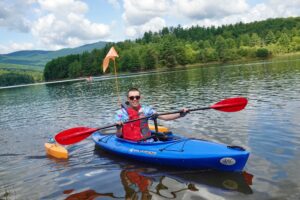
Brandon’s kayaking skills greatly improved this summer and included going to a straight paddle.
“I felt like this year was a good year for progress,” comments Marcy Pelkey, an Occupational Therapist at LSSU and a GMAS Board member who volunteers weekly for the program. “For some of our participants, this is their third year and they are really progressing and acquiring more skills. Parents and guardians say that their child looks forward to kayaking each week and the parents love seeing the progress they make too!”
Carrie Dessureau agrees with that comment and adds that progress is also found in other parts of the athletes’ lives. “I had one mom tell me that her son found it easier to climb stairs step over step after kayaking.”
She continues, “Thanks to Cathy Webster and the NDAA program, GMAS has been successful in introducing students to a lifelong activity that builds confidence and gives participants freedom on the water.”
Success and accomplishments
This year’s highlights were numerous and truly remarkable. Here are just a few highlights:
Among the returning athletes, Brandon no longer requires a tether, AND is now using a straightened paddle. David, who has been hard to keep up with for the volunteers, paddled even twice the distance from last summer. It was so fun to see Geoffrey’s increased curiosity and his enjoyment of being on the water exploring the Reservoir. He especially loved paddling in the rain!
Ten new participants joined the program including Laura who also is a scholarship recipient for the indoor climbing program, and Gavin’s brother, Carter, who joined in for the last couple of sessions.
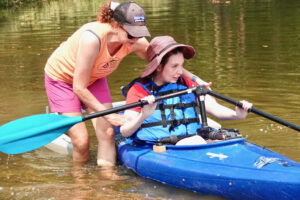
Tiffany growing confident in the kayak with the support of a volunteer.
We are also celebrating Tiffany who was able to leave the shore tethered and to get out in the open water. Finally, Mae and Geoffrey performed successful wet exits, a skill that will allow them the confidence to paddle without outriggers.
GMAS wishes to congratulate all of the athletes involved in this incredible program. We’d also like to recognize the endless patience and contributions of Cathy Webster and the many volunteers including Marcy Pelkey, Carrie Dessureau, and Meg Denton.
Get involved
Consider making an online monthly or annual donation to help us continue to expand this incredible program. You can also fill out this form to volunteer with GMAS or contact us for more information at info@greenmtnadaptive.org.
